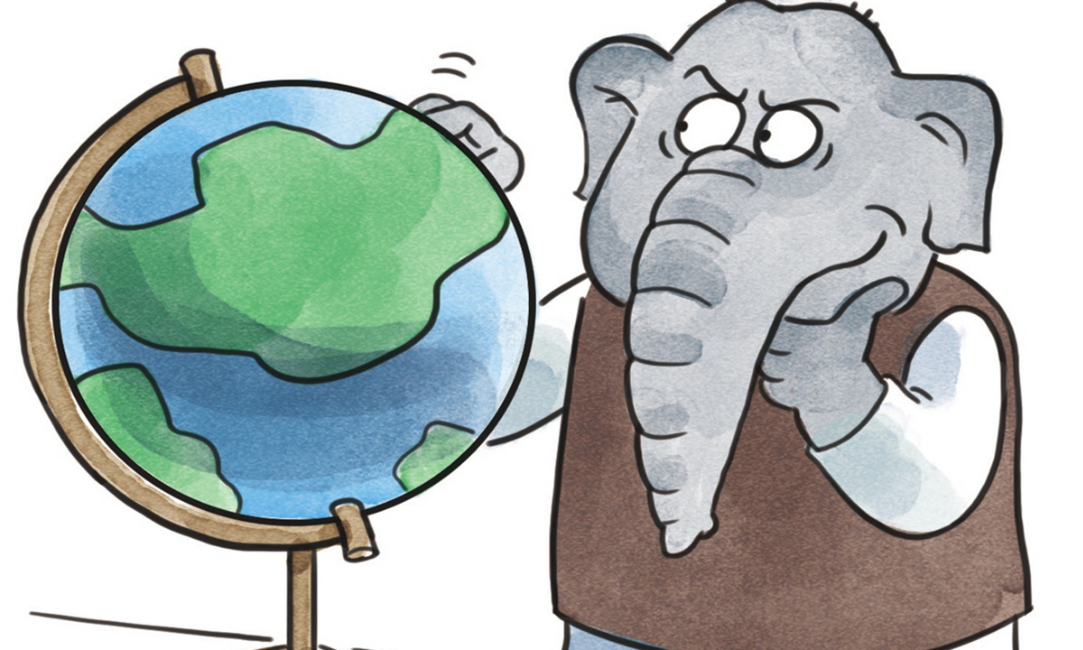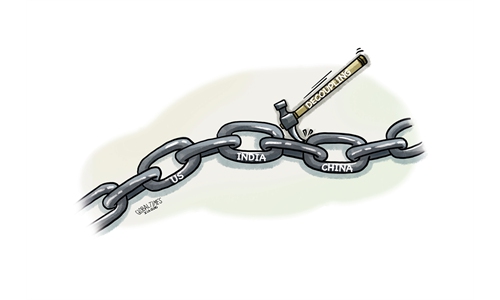
India Illustration: Liu Rui/GT
Amid the US-touted high expectations, Indian Prime Minister Narendra Modi on Tuesday embarked on his first state visit to the US, and is expected to meet with US President Joe Biden on Thursday, as Washington's desire is stronger than ever to woo New Delhi as its ally to counter Beijing and Moscow, experts said.
Although some analysts believe that India is using some gestures to maintain the US' illusions about India's "strategic turn" so New Delhi can ask for more benefits from Washington, they also reminded of the importance of India keeping to its strategic autonomy, as leaning toward the US would be risky as it means that New Delhi would become a rival of both China and Russia.
Describing it as a "turning point" of the US-India ties, Reuters said that the deeper cooperation in the defense industry and sharing high technology would be in focus, as the visit is expected to give India access to critical US technologies.
The US is likely to approve General Electric to manufacture engines in India for its domestically produced fighter jets, and greenlight India's purchase of 31 armed MQ-9B Sea Guardian drones made by General Atomics worth $3 billion, according to Reuters.
Media reported that Washington wants to wean New Delhi away from its traditional defense partner Moscow while seeking to develop a common understanding about China and attempt to coordinate and align actions around it.
The two sides are also expected to discuss cooperation domains in semiconductors, cyberspace, aerospace, strategic infrastructure and communication, and the use of artificial intelligence in the industrial and defense fields, according to an Indian official.
Modi will receive a South Lawn welcome, a state dinner, and will address a joint session of Congress, according to Indian media.
Zhao Gancheng, a research fellow at the Shanghai Institute for International Studies, told the Global Times that accepting the wooing of the US means acting as the US' geopolitical pawn and sacrificing India's strategic autonomy and national interests.
An India with closer ties and deeper dependence on the US in terms of military technology and intelligence is something Washington might like to see, Zhao said.
India's recent gestures have raised the US' expectations for a "strategic turn" of New Delhi, Lin Minwang, a professor at the Institute of International Studies of Fudan University, told the Global Times.
For instance, in the first face-to-face meeting between Modi and Ukrainian President Volodymyr Zelensky, Modi promised that India "will do whatever we can for the resolution of war," according to media reports. India has also intensified a crackdown on Chinese smartphone companies operating in India, showing a tough stance toward China.
Modi on Tuesday said the US invitation is a "reflection of the vigor and vitality of the partnership between our democracies," and that "together we stand stronger in meeting the shared global challenges," the Hindustan Times reported.
This is the approach that New Delhi has always been good at, Lin said. "It accurately grasped the mind-set of the US to counter Russia and China, and induced the US to offer high prices to win itself over," he said.
New Delhi should be wise to know that completely leaning toward the US for the US' strategic pursuit means India will alienate itself from China and Russia, Zhao said, adding that "it is more beneficial for India to maintain a balance between major powers."
Earlier in June, India's Deputy National Security Adviser Vikram Misri said at the Shangri-La Dialogue in Singapore that "India does not believe in partnering in military alliances. We are, however, a partner for many countries including in the military and defense field," according to The Economic Times.
India has been only willing to obtain the benefits provided by the US from a strategic point of view, and would not undertake any obligations as American allies, Lin said.
Unless the US is willing to keep paying a high price to attract India, sooner or later, the two sides will disappoint each other, Lin noted.

